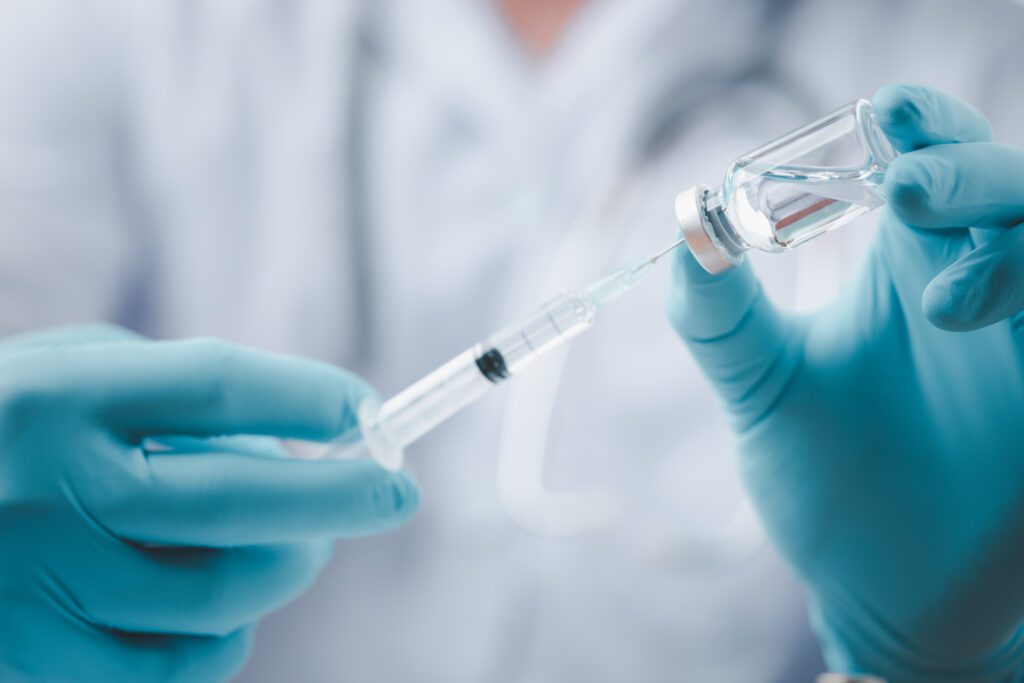
This blog post was last checked and updated February 2026.
Respiratory syncytial virus (RSV) is a major respiratory virus that is common over the winter period, typically November to February. While the symptoms are mild for many, RSV accounts for around 30,000 hospitalisations of children under 5 in the UK annually, and for 20 to 30 infant deaths.
RSV can also be severe in older adults, causing pneumonia and flare-ups of existing lung disease and other long-term conditions. It causes around 9,000 hospitalisations in those aged over 75 in the UK each year.
Who is at risk?
RSV can be especially dangerous for infants and the elderly.
RSV is most common in infants under 1 year old. Babies are particularly vulnerable to RSV lung infections as they have small airways and have limited immunity against the virus which can lead to a condition called bronchiolitis that causes inflammation in the lung.
Bronchiolitis is different from bronchitis, which causes a cough with lots of mucus and can affect people of all ages. More information on bronchiolitis is available on the NHS website.
Infants with severe bronchiolitis may need intensive care and the infection can be fatal. Older adults can also be at risk of severe RSV lung infections, and the virus is a cause of illness and mortality in people aged 75 years and older.
The symptoms of RSV
RSV may cause a cough or a cold, wheezing, shortness of breath, tiredness and fever. RSV symptoms in babies can also include irritability and the infant may feed less than usual. Most cases are not serious and clear up within 2 to 3 weeks. You can find out more about the symptoms of RSV on the NHS site.
RSV can also cause bronchiolitis in infants, which can make it difficult to breathe and feed. RSV bronchiolitis symptoms may include difficult, fast or noisy breathing and may cause the infant to be unsettled or difficult to comfort.
RSV vaccination
The government has accepted advice on extending the eligibility from the Joint Committee on Vaccination and Immunisation (JCVI) for the RSV vaccination programme.
On 2 February 2026, the government decided, in line with JCVI advice, that the RSV vaccine should be offered to additional groups in the population most vulnerable to serious outcomes from RSV infection and who are therefore most likely to benefit from vaccination.
From 1 April 2026, vaccination will be offered in England to:
- adults aged 80 years and over
- all residents in care homes for older adults
This is in addition to the existing programme, which offers RSV vaccination to:
- adults turning 75 years
- adults aged 75 to 79 years when the programme began
- pregnant women (to protect their newborn babies)
Those who are eligible for both RSV and COVID-19 vaccinations will be able to get both vaccines at the same appointment once the spring 2026 COVID-19 campaign begins on 13 April 2026, in line with JCVI guidance. Individuals eligible for both programmes include people who have not already had an RSV vaccine and are either:
- aged 75 or over
- a resident in a care home for older adults
Visit the NHS website to find out more.
How can I protect my baby from RSV?
The best way to protect babies against RSV infection is for the mother to have the vaccine during pregnancy. Vaccination reduces the risk of severe RSV lung infection by 80% in the first months of life.
The vaccine boosts the pregnant woman’s immune system to make antibodies that can fight RSV infection. These antibodies then pass through the placenta to help protect the baby from birth.
The vaccine is offered from week 28 of pregnancy, often by maternity services, but GP practices can give it too. If you haven’t been offered the vaccine around the time of your 28-week antenatal appointment, contact your maternity service to make an appointment. Having the RSV vaccine in week 28 or within a few weeks of this gives the best protection for the baby, including if they are born early.
Having the vaccine later in the pregnancy will still provide some protection from infection and reduce the risk of spreading infection to the newborn baby. If it wasn’t possible to have a dose earlier, it can be given right up until you have the baby.
Is more than one dose of RSV vaccine needed?
Pregnant women should have the RSV vaccine in every pregnancy – this will give your new baby the best protection.
In older adults, a single dose is expected to give good protection for a few years. A single dose of vaccine will help to boost protection as you reach an age group at highest risk of serious RSV infection.
Preventing the spread of RSV
RSV can spread through coughs and sneezes.
You can help to prevent the spread of the virus by covering your mouth and nose when you cough or sneeze (ideally with a tissue, or else into the bend of your elbow), and you can wash your hands with warm soapy water frequently to kill the germs.
If you have symptoms that could be RSV you should try and avoid young babies. It is perfectly okay for parents to ask people with colds to keep away from newborn babies, particularly in the first few months, and for babies born prematurely.
Even with these measures it can be difficult to avoid RSV infection.
